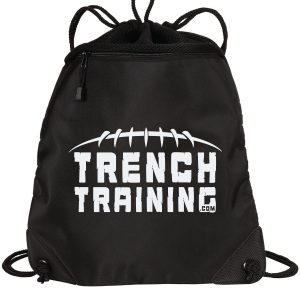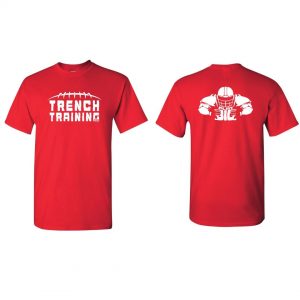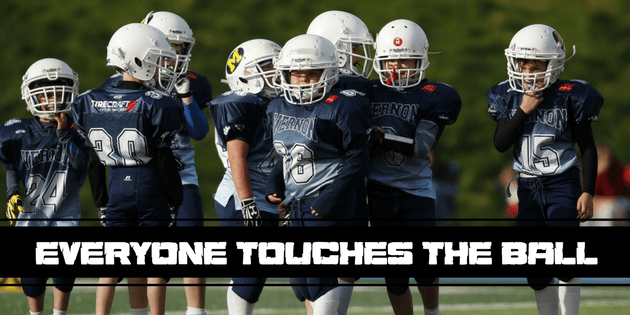
by Steve Stark | Apr 2, 2018 | Blog, coaching kids, youth football
When you’re a big kid playing youth football everyone expects that you are going be a natural. However, many times, these big kids have no idea how to use that big body. And so, they get yelled at for being soft and often put on the line to never touch the ball.
What makes football fun for young kids?
Fun = getting to touch the ball in a game.
Just play. Have Fun. Enjoy the game. – Michael Jordan
Last year my 3rd grade son, Jacob, played flag football for the our local park and rec. 3rd and 4th graders are certainly a challenging age but I thought the coaches did a good job with the kids. They taught fundamentals at every position and were very patient with the kids.
There was however one thing that I found extremely frustrating. Only about half the kids on the team got to play positions where they handled the ball.
My son is a big kid. Twice the size of some of his teammates. Because he’s so big and growing so fast he’s also not real coordinated. He may be destined to play with his hand down some day. But it doesn’t have to be in 3rd and 4th grade flag football.
Flag football will be the only opportunity that Jacob and other big kids like him will have a chance to touch the ball. When our kids start playing tackle football there are weight limits on who can and cannot touch the ball. As a 3rd-grader, Jacob is already too big to carry the ball in our 5th grade tackle program.
Each week he came home after practice and said he wished he could play quarterback. I would ask if he gets to practice playing quarterback or running back or receiver… nope. He got super excited just to play center because he got to touch the ball in a game.
Jacob said football was fun. But I could tell it wasn’t that much fun. It wouldn’t have been for me if I was 9 and playing right guard and defensive tackle all season.
If we want to keep kids like Jacob in the game of football, then we need to make sure they are having fun. Not just in practice but in games as well. That means giving them the ball a couple times throughout the year in an actual game.
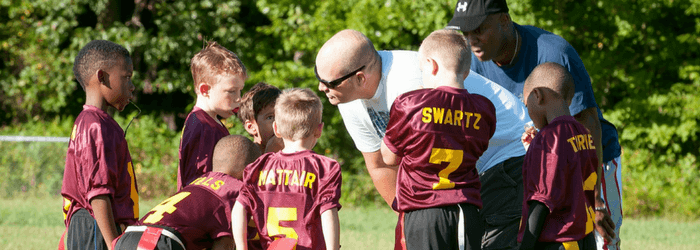
This past season I decided to coach my son’s 3rd and 4th grade flag football. Needless to say, it is a challenging age to coach in any sport but it was a lot of fun. My number one goal was to make sure that every kid on the team had the chance to play every position in an actual game.
Every kid played quarterback, running back, wide receiver, tight end, defensive back, linebacker and of course positions on both the offensive and defensive lines.
Did we win every game? Not so much. But all the kids had fun.
Jacob got to play quarterback and it was probably the most fun he’s had playing a sport. Jacob threw for a 2-point conversion and his buddy (2nd biggest kid on our team) ran for a touchdown. With no speed between the two big boys, we actually won that game. Go figure.
We played teams that had the same kids in the same positions for the entire season. Their best players of course were at the quarterback and running back positions. They won a lot of games. I wonder though, how many kids did they lose from the game? How many of those kids that never touched the ball will want to come back and play next season?
Is winning worth losing kids from our game? It isn’t. It NEVER is.
Who Cares About Winning?
Who cares about winning 3rd & 4th grade flag football championships? Do the kids really care that much?
I can tell you, without a doubt, they don’t. They care about being with their friends. They care about going for ice cream after the game. They care about having fun.
Parents care about 3rd & 4th grade championships. It’s difficult. We, as parents, want the best for our kids. We want them to win at everything. There’s nothing wrong with that. But we need to realize that there are consequences when all we care about is winning.
Now don’t get me wrong. I am as competitive as any person you will ever meet. I want to win. I want my kids to win.
My goal is to keep my kids active in team sports and to learn the fundamentals of the game. I will always encourage my kids to play team sports.
All the encouragement in the world won’t matter if they don’t enjoy playing.
We need to make sure we put fun and learning first at the youth level and winning second.
Who Do Kids Want To Be?
Do 9-year-olds dream of being an offensive lineman? No.
Kids are not sitting around on Sundays watching offensive linemen make plays. Kids watch the NFL and see players like Odell Beckham and Tom Brady and they want to be those players. They dream about making the same plays that those players make every Sunday.
When they play pick-up games at recess or in the backyard, they want to score touchdowns. We need them to keep dreaming like that. Just because they’re big doesn’t mean we should discourage those dreams.
Kids develop very differently and today’s big lineman may be tomorrow’s all-star quarterback or tight end.
Let them PLAY and DREAM.
For Jacob, next year the pads go on. I know he’s excited. He’ll have to play on the line because of his size and I hope his coaches will work to make it a fun experience.
Football is a game. It has to be fun. And we have to do everything we can to make it fun for our kids.
Have you had a similar experience with your youth football player? Let us know. Be sure to comment and share this article.
Let’s spread the word about making youth football about fun and not just winning.
Play BIG!
Coach Steve
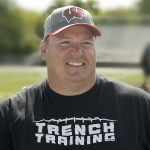

by Steve Stark | Oct 25, 2016 | coaching kids, youth football
Are there specific offensive line skills our kids should be learning?
Of course there are!
So why do coaches not spend the time to teach offensive line skills?
We have quarterbacks, running backs and receivers doing ball drills all year long.
The traditional “skill” players are now very heavily involved in 7 on 7 leagues and there are tons of camps designed for these positions.
What do we have the linemen do?
Lift.
While getting bigger and stronger is certainly important, there are actual position specific skills to focus on as well.
Linemen make up nearly half of the offensive team on the field.
Include a tight end, who should have these skills, and it’s more than half.
Yet we often spend the least amount of time developing offensive line skills.
We hit sleds, we hit each other, but we don’t work enough technique.
What are some of the skills offensive linemen can be working on?
4 Critical Offensive Line Skills
1. Stance
Is stance really a skill?
It is. And it’s quite possibly the most important skill for young linemen to learn.
Offensive line is the most unnatural position in sports.
Throwing, catching, kicking and running all involve very natural movements.
Getting into a stance is unnatural and takes a lot of time and repetition.
An offensive lineman’s stance is the foundation of their game.
Without a great stance, players are limited in their ability to make great plays.
2. Footwork
Speed is not a necessity in the offensive line.
However, agility is.
Once players perfect their stance they then need to be able to get out of that stance and attack.
Having fast feet will allow them to get into the proper position to make a block.
Keeping their foot in the ground is also important to maintain strength, leverage and balance.
All or which are needed to be a good offensive lineman.
3. Punch
Up front, football is about striking and maintaining blocks.
A player’s speed and strength with their punch helps them to create leverage.
Keeping tight hands is critical to having an effective and powerful punch.
Tight hands also keep referees’ flags in their pockets. (Because we NEVER hold… 😉 )
4. Pass Sets
We have a lot of coaches and players tell us they don’t really need to ever pass set.
Really?
If you want to have any chance to play at any college level then learn to pass set.
The technique will help your balance and lateral movement.
So even if you are in an offense that never uses a pass set, there is still a benefit to learning the techniques.
These are all skills that players can work on year round.
They may not be flashy but if a young player makes the time to put in the work it will pay off.
If you you found value with today’s post please like, comment and share.
Play Big!

Coach Steve
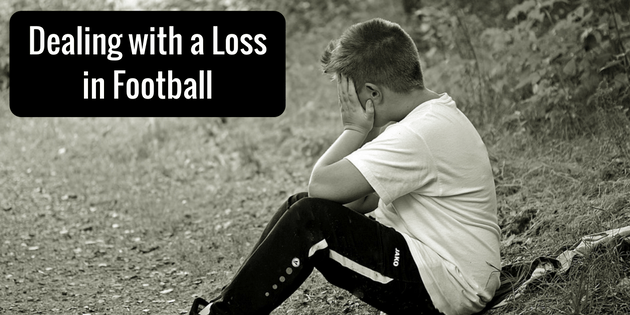
by Steve Stark | Sep 5, 2016 | coaching kids, youth football
Dealing with a loss in football is never easy.
Let’s just say it… losing SUCKS!
Everyone will deal with a loss in football.
I can guarantee you will not go undefeated your entire career.
We all experience difficult losses in football and in life.
How we handle those losses and what we learn form those losses makes us who we are.
In today’s video I discuss some ways to turn a loss into you most valuable learning experiences.
[video_player type=”embed” width=”560″ height=”315″ align=”center” margin_top=”0″ margin_bottom=”20″] [/video_player]
[/video_player]
[hyperlink style=”1″ href=”http%3A%2F%2Ftrenchtraining.com%2Ffree” font_size=”20″ font_style=”bold” font_color=”%23d11515″ align=”center”]Click Here to Become a BIG PLAYER with our FREE TrenchTraining.com Membership![/hyperlink]
Lessons from Dealing with a Loss
Dealing with a loss reveals your character.
Compared to dealing with a loss, winning is easy.
Although, winning has it’s difficult moments as well.
Both will reveal the character of a player… but a loss, even more so.
Football is an emotional game.
Players will face adversity in every game they play.
How you deal with that adversity defines a player.
I had a chance to watch my Wisconsin Badgers beat LSU this past weekend and it was awesome.
… if you are Badger fan.
Many people are still talking about a cheap shot that an LSU linemen gave a badger player at the end of the game.
[video_player type=”embed” width=”560″ height=”315″ align=”center” margin_top=”0″ margin_bottom=”20″] [/video_player]
[/video_player]
That’s what losing can do to some players.
Emotions and frustration run high.
A young man makes a mistake and not only did he lose a game but now he has to face a suspension.
That’s a difficult lesson but one that I hope he learns.
Keep emotions in check.
As I said above, football is a very emotional sport.
Keeping an even head can be tough.
Players never want to get too high with a win or too low with a loss.
If you play sports you have to have a short memory.
That doesn’t mean a player can’t celebrate a win or be upset about a loss.
But players have to move on quickly especially when you have a game next week.
What kind of a teammate are you?
NEVER play the blame game on a football team.
We win together and we lose together.
No one player is solely responsible for a win or a loss.
That’s the great thing about football. It is the ultimate team sport.
When players start pointing fingers at others after a loss, the team suffers.
That kind of behavior is toxic on a football team and will ensure that team is not successful.
Instead players need to pick each other up.
Have an appreciation for what your teammates do.
Realize that everyone’s job is important and EVERYONE will make mistakes.
Be a good teammate and be a leader.
Realize why you lost.
Why did you lose?
Was the other team more talented?
Did they execute better than you?
Was it a lack of effort from your team?
You need to understand why you lost in order to learn and get better.
Focus on the things that YOU can control.
How can you improve from week to week?
Someone has to win and someone has to lose.
Losses teach us much more than wins.
If you make dealing with a loss a strength those losses can help build championships.
Always be learning and always continue to get better.
I hope you found value with these tips on dealing with a loss.
If you did please like, comment and share.
Play Big!

Coach Steve

by Steve Stark | Aug 14, 2016 | coaching kids, youth football
If you are around sports long enough you get to meet many different types of coaches.
Some good, some bad, some crazy. Some that make us crazy.
Before we get into discussing the types of coaches that drive us crazy I want to say that I admire every coach.
Being a coach is a very special job.
It’s not always an easy job and it’s not for everyone.
But anyone who really tries and has the kids best interest at heart should be applauded.
No matter how “good” of a coach they are.
In today’s video, I discuss a few types of coaches that are difficult to deal with and some tips to make the best of each situation.
[video_player type=”embed” width=”560″ height=”315″ align=”center” margin_top=”0″ margin_bottom=”20″] [/video_player]
[/video_player]
[hyperlink style=”1″ href=”http%3A%2F%2Ftrenchtraining.com%2F” font_size=”23″ font_color=”%231414ad” align=”center”]Get Your FREE Membership to Exclusive Content at TrenchTraining.com[/hyperlink]
5 Types of Coaches that Make Us Crazy
Screaming Steve
We’ve all had a yeller for a coach. Screaming Steve has to hear his voice over everyone and everything.
In fact, you probably wonder if Steve is trying to be heard 3 towns over.
First off, not all coaches that yell are bad. Some of the best coaches I have had were loud and obnoxious at times.
The reason they were good, however, was that they were instructing not just yelling.
Screaming Steve yells things like “BLOCK!”, “TACKLE!”, or “PLAY BETTER!’
That’s not coaching. Those things don’t make anyone better.
A coach instructs a player on how to block, how to tackle and how to play better.
They don’t just yell.
How to deal with Screaming Steve:
I once got a great piece of advice about yelling coaches.
Most coaches yell because they care and they are trying to make you better.
If they stop yelling… that is when you worry.
Try to explain to your athlete that yelling doesn’t mean a coach doesn’t like you.
It’s often that they just want to make you a better player.
Negative Ned
Praise loudly, criticize softly.
That’s the best coaching advice I have ever been given.
Humans respond better to praise than criticism. Period.
Yet there are many coaches who focus on telling players what they are doing wrong.
Of all the types of coaches, Negative Ned is the most difficult for me to accept.
Now you might say, “Well isn’t that what a coach is supposed to do?’
Not really. A coaches job is to teach.
Again, what we are talking about here is the style of the coach.
Leading with criticism automatically puts a player, especially a young player, on the defensive.
Negativity will always breed this reaction.
Even if the coach teaches the proper technique incredibly well, if they led with negativity all time, the player will not absorb the teaching as well as if they had led with positivity.
“Well it can’t all be rainbows and sunshine, right?”
Maybe not. But If a coach leads with a positive comment they will get better results.
Let’s look at two different scenarios…
Negative Ned stops the drive blocking drill by yelling, “Stark! Are you kidding me? That was a terrible block! You have to get your helmet across on this play. Do your job!”
What’s wrong with the statement by Ned?
First, the sarcasm with “Are you kidding me?” is worthless. It serves no purpose other than to belittle the player.
Second, after your athlete hears “That was a terrible block.” They are going to tune out the rest.
Your athlete gets defensive and shuts down.
Here’s the second scenario from another coach named Positive Pat.
Positive Pat stops the drive block drill and says. “Stark! Great job with your feet and I really like how you used your hands there. The only thing I want you to do better on this play is to get your head across. That’s going to get your head in the hole and help you sustain your block.”
Pat reinforces what the player did right in the drill and then made a correction and told him how he could do it better next time.
Another key point here is to explain WHY the player needs to make the correction.
Can you see the difference here? It’s night and day. Great job Pat!
How to deal with Negative Ned:
Tell your athlete to focus on the instruction.
The negative comments are often that coaches way of trying to get a players attention.
As an athlete, you have to build up a thick skin because there will always be negativity.
Unfortunately, negativity is everywhere and not just in sports.
Loophole Larry
There’s always that guy that know ever by-law of every rule set out in the rec league handbook.
And Loophole Larry enforces then every chance he gets.
Even if it means holding up a game to argue with a referee and look the rules up.
(Larry keeps a copy of the league handbook in his back pocket at all times. He probably sleeps with it.)
Larry is very much concerned with the 5th-grade league championship.
He plays all the kids, but the best players play 90% of the time.
Don’t be Larry.
How to deal with Loophole Larry:
This is a great time to teach your athlete the importance of patience.
Patience is the key.
The problem with Larry is that he is often correct about the rules.
Especially the more odd and obscure ones.
Know-It-All Norman
Norman was an Honorable Mention All-Region defensive tackle back in the day.
He knows the game inside and out… just ask him.
His way is the ONLY way that is acceptable.
Norman is very defensive about his coaching and thinks all the parents are idiots.
Even the ones that had a cup of coffee in the NFL.
Mr. Know-It-All also generally fits into one the first two types of coaches with Screaming Steve and Negative Ned.
How to deal with Know-It-All Norman:
Offer to help with the team.
Even if it’s just occasionally helping with a drill.
Know-It-All Normans tend to tone it down when there are other confident adults in the vicinity.
Casual Carl
Carl’s a real laid back dude.
He’s never really played any sports but he wanted to volunteer for his kid. (Which is great by the way.)
But Carl just lets the kids kind of coach themselves.
Freedom and having fun are all Carl is about.
Now, kids should have fun when they play any sport but a coach must also maintain control of a team.
Too much freedom and flexibility can lead to unmotivated players.
That’s when the team goes sideways and that’s never good.
How to deal with Casual Carl:
This is another opportunity to step in and help.
Offer to organize team activities.
Adding a little structure to the team may be enough to keep it from becoming a free-for-all.
The Best Coach I Ever Had
In college, I definitely had a Screaming Steve for a coach.
At first, I was terrified of him.
This coach was so intense that there were times I didn’t think I was going to make it at college.
Eventually, I figured out that it was just his style of coaching.
He was mad at the players.
He just used yelling as his way to teach.
The thing that really made me realize this was his attention to detail.
He was the most technically demanding coach I have ever met.
That paid off for me as I was not always the biggest or strongest guy on the line.
However, I was a great technician of the game and my coach made me that way.
There are many types of coaching styles.
We certainly can’t list them all here.
Did you ever experience a difficult coach as a player or parent of a player?
Have you experienced any of these types of coaches?How did you handle it?
How did you handle it?
We’d love to hear your comments.
I hope you found some value with today’s post.
If you did please like, comment and share.
Play Big!

Coach Steve
Photo credits:
Marianne O’Leary – Edited
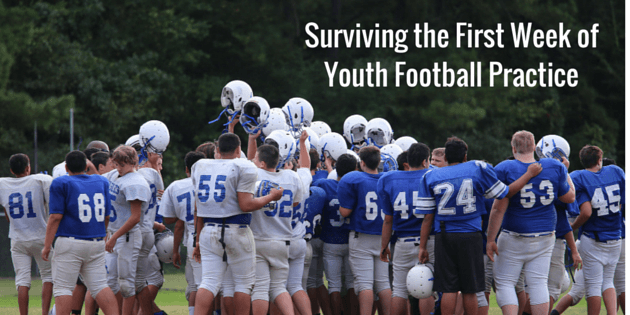
by Steve Stark | Jul 25, 2016 | youth football
The first week of youth football practice is almost here!
This is one of most exciting weeks of the year.
It’s also one the scariest and most difficult weeks of the year for players at all levels.
I know I felt that excited, nervous feeling every single year I started a football season.
As I got older there were a few questions that I would always ask myself.
Am I in good enough shape?
Where do I fit in on this team?
Will I be good enough to play?
How hard is this first couple of weeks going to be?
Will I make it?
That anxiety mixed with excitement is something that makes football very special.
I never felt like that with any other organized sport that I played.
As a first year player, at ever level, there is also a sense of fear.
Fear of the unknown.
It’s a fear that can be overcome.only going through a tough couple weeks of practice with your teammates can be overcome
Overcome, only by going through a tough couple weeks of practice with your teammates.
Those experiences will force your athlete to form a bond with his teammates that will last a lifetime.
Again, that is what is so special about football.
So what can you do as a parent to help your athlete get through that first week of youth football practice?
Make football the best experience possible for your child.
Here are some tips to help your athlete survive that first week.
[video_player type=”embed” width=”640″ height=”360″ align=”center” margin_top=”0″ margin_bottom=”20″] [/video_player]
[/video_player]
5 Tips to Survive the First Week of Youth Football Practice
1. Stay hydrated and eat well.
Water, water, water!
Late July and early August is hot all over the U.S.
Your athlete needs to drink lots of water to stay hydrated.
Eating healthy is also important.
Don’t let your kid sit around and eat junk food all day.
There’s nothing worse than having a belly ache in 90-degree weather while you’re working out.
2. Get rest.
Football is a physically challenging sport.
Regardless of how fit your athlete is at the beginning of the football season, their bodies will be sore and tired.
They need good rest.
Be sure that your athlete is getting a solid 8 hours of sleep minimum every night.
It may still be summer, but staying up late to play video games and watch tv will not help your athlete recover.
The best remedy for sore, tired muscles is rest.
Also, try to get your athlete in a pool if you have access.
This is also great for recovery.
Just don’t let them go nuts for hours and defeat the purpose of pool time for recovery.
3. Wear comfortable clothes.
The one thing I did every year I played in college was to break my cleats in.
It doesn’t take much.
Just get a few workouts in with your cleats on.
Have your athlete get together with some friends and play touch football or even wiffleball while wearing their cleats.
Make sure your athlete is comfortable with their clothes too.
Showing up to practice in jean shorts is not comfortable.
Get some athletic clothes.
If you’re not sure what your athlete needs then ask the coaches.
You don’t have to break the bank with Nike and Under Armour gear but you need to get them comfortable clothes.
4. Let the coaches coach.
Trust that the coaches for your child’s team know what they are doing.
And remember… almost all of them are volunteers.
Don’t be barking at people who are willing to work with your kids for nothing.
Especially when you are not.
Every youth program welcomes help.
If you feel like you can contribute to the program let those in charge know and see if there is a need you can fill.
As a dad myself, I know first hand it can be difficult to coach your own child.
Keep this in mind as you volunteer to coach.
Whatever you do, don’t be an armchair quarterback for 6th-grade youth football practice.
Nobody likes that parent.
Nobody.
5. Don’t let them quit.
I live by the saying, “If it were easy, everyone would be doing it.”
Football is hard.
It’s not for everybody but your child won’t know that if they quit after the first day.
The first day your child practices in pads will probably be the most difficult day of football in their entire lives.
This is when parents most often get the, “I want to quit. Football is too hard.”
Don’t let your child quit because it’s too hard.
Hard is what makes it worthwhile.
Hard is what makes it fun.
Hard is what teaches life lessons that your child will carry with them for the rest of their lives.
I recently wrote a post about how I Almost Quit Football.
It is my belief (which I learned from my dad), that when you start something you finish it.
You never quit because it’s too hard.
99% of kids who say they want to quit after that first day, if they stick it out for a week, will love football forever.
You as a parent have to be strong enough to help them realize that.
If after that first week they hate it, go talk to the coach.
Make sure nothing else is going on.
If there isn’t any other reason and your child just doesn’t like it, then make a decision.
Just make sure this is not a lesson that your child misses because YOU are not strong enough to help teach it.
This really is one the greatest couple of weeks of the year.
Some of the things I remember…
…the smell of the cut grass, the nervous feeling leading up to practice each day, the laughs I had with my friends, the difficulty of conditioning and how much I hated it, and the elation of finishing a practice each day.
What do you remember from youth football practice?
Leave a comment and let us know.
Football has taught me so much and so much of that came through overcoming difficult times.
Enjoy this time in your child’s life and help them to create awesome memories.
I hope you found some value with today’s post.
If you did please like, comment and share.
Play Big!

Coach Steve
Photo credits:
Jill Carlson on Flickr.com
Matt Preston on Flickr.com

by Steve Stark | Jun 7, 2016 | youth football
In today’s post I want to share how I almost quit football.
I learned a very valuable lesson in my first year of organized football.
That lesson was, “Never quit because it’s too hard.”
I just read an article about how 70% of kids quit sports by the age of 13.
There are many reasons why kids quit but the big one is that they just aren’t having fun.
We need to understand why kids are quitting and above all else make sure they are having fun.
My hope is that you or someone you know might relate to this story.
Why I Almost Quit Football
When I was 9 years old I started playing tackle football for the Roscoe Lions.
I was so excited to play!
At that time, (and for the majority of my youth) I was, by far, the biggest kid in my class.
Everyone was ready for me to start playing football.
When I was 9, I had already played a couple years of basketball and baseball.
I was a pretty athletic kid for my size but I was a little overweight and a bit of a softy.
That year did not go like I had expected. Not even close…
As I look back on that first year of football, there were 3 things that nearly made me quit.
 1. Size isn’t everything in football.
1. Size isn’t everything in football.
With my size, even being somewhat athletic, I was much slower than most kids.
Because of the speed difference, the smaller kids hit harder and I did not like getting hit.
Football is hard. Especially for a young, big kid.
I quickly realized that football was much harder than baseball and basketball.
Wearing equipment and running in that equipment was not as fun as I thought it would be.
This seems to be a common theme for big kids in football (and other youth sports for that matter).
Big kids are often a little more awkward and they struggle to keep up with the conditioning.
While these big kids may be growing faster they are not often developing faster.
I am reminded of this all the time as I watch my 8-year-old who is already over 5 feet tall.
It’s like looking in a mirror.
He has no clue how to use that body… but he will.
It just takes time.
2. Managing everyone’s expectations.
Everyone thought I should be really good, including me.
I was huge. How could I not be good?
When it took me a while to get going I felt like I was letting people down.
I was disappointed in myself too.
It’s weird but I actually remember that feeling very clearly.
 3. I felt like a target.
3. I felt like a target.
Especially for the older, smaller kids. I was a big kid they could knock down.
And they knocked me down a lot.
It got to the point where I felt bullied.
That experience certainly toughened me up and helped me learn to stand up for myself.
Fortunately, before it got out of hand, I believe my coaches and my dad helped stop the bullying.
We are far more conscious of bullying today but it still happens and we must always be on the lookout for bullying.
Nothing deters a kid from an activity faster than bullying.
So the combination of these 3 things had me calling my dad at work nearly everyday before I had to go to football practice.
The conversation was always the same:
Me: “Dad, I don’t want to go to practice today. I don’t think I like football any more.”
Dad: “Why don’t you like it?”
Me: “I don’t know. It’s too hard.”
Dad: “Of course it’s hard. If it were easy everyone would do it.”
Me: “I want to quit football.” (crying)
Dad: “You begged me to sign you up this year. You have always loved football. If you quit football now, I am not going to sign you up again.”
Me: “It’s too hard.”
Dad: “Steve, once you start something, you finish it. You don’t quit. You don’t quit because something is too hard. You do the best you can but you never quit.”
And that was it. My dad didn’t let me quit football.
I have been extremely fortunate to have incredible parents.
My dad was a great athlete when he was younger but he never told me I had to play sports. It was always my choice.
He encouraged the heck out me.
He put up with crying and complaining.
He talked to the coaches and let them know that I was not having fun. (I believe he also had a hand in stopping the bullying.)
He ended up coaching and helping me get through that first year.
By the end of the season, I was starting to figure things out.
Football was fun again.
So often, this experience makes me think about how many kids don’t have an awesome dad like I do.
Would every dad have gone through the crying, the complaining, and the calls at work?
Would every dad step up, take time from work, and help coach so his son was more comfortable at practice?
I’d like to think so, but the truthfully the answer is no.
That’s why I feel so fortunate to have my dad.
What would have happened if my dad had let me quit?
No all-state honors as a senior.
No full-ride scholarship to the University of Wisconsin.
No Rose Bowl Championship.
No free-agent contract with the New York Jets.
Maybe… no coaching for almost 20 years so that I can help other big kids become better football players.
I learned a lesson that year that has served me throughout my life.
Never quit because it’s too hard.
I have used this with my own kids.
My oldest daughter begged me to swim competitively when she was 10 years old.
After the first week, she was crying and ready to quit. It was too hard.
The memories of my first year of football flooded back.
My dad’s voice was in my ear, “You don’t quit because it’s too hard.”
I told my daughter the same thing.
“You don’t quit because it’s too hard. You finish what you started. If you don’t want to do competitive swimming after this season you don’t have. But you can’t quit.”
After about 2 weeks she got used to the training and enjoyed it the rest of that season.
This is one of the greatest lessons of my life and I am so glad I now get to teach it to my own kids.
When your child asks to quit a sport you need to understand the real reason.
There are very few good reasons to quit football.
These are the questions I would find the answers to (and not just from your child but from coaches and other parents).
Questions to answer before you let your child quit football.
1. Are they being bullied?
This is the first question I would ask.
I would also be sure to speak to the coaches and other parents to make sure your child isn’t afraid to answer this question.
Bullying is intolerable.
A good coach will put a stop to it quickly.
2. Is the coach abusive?
Abuse comes in many forms.
From a coach, it often comes verbally.
Now I am not saying that a coach can never discipline a player.
But how that discipline is handled is extremely important.
I am big believer in “praise loudly, criticize softly”.
Youth football should be, first and foremost, about having fun.
3. Is your child in danger or hurting?
Is there a physical reason why your child is not having fun?
Asthma is big problem in a fall sport that’s outdoors.
Kids often have to deal with growing pains too.
My 8-year-old has them all the time.
Be sure to listen to your child’s complaints about pain.
Some may be soreness but if you’re not sure get them checked out by a physician.
These are all valid reasons for a child to quit football.
Maybe they just don’t like it. It’s not for everyone.
All I ask of my kids is that they try and they finish what they start.
Too hard is not a reason to quit football.
Overcoming “too hard” is how we learn.
Getting past “too hard” is how we get better.
Quitting can become a habit very quickly.
Be sure that your athlete understands that when something is hard… that’s the opportunity to really have fun.
That feeling of accomplishment is one of the greatest aspects of sports.
It will serve them forever. I know it has served me.
I hope you found some value with today’s post.
If you did please like, comment and share.
Play Big!

Coach Steve














